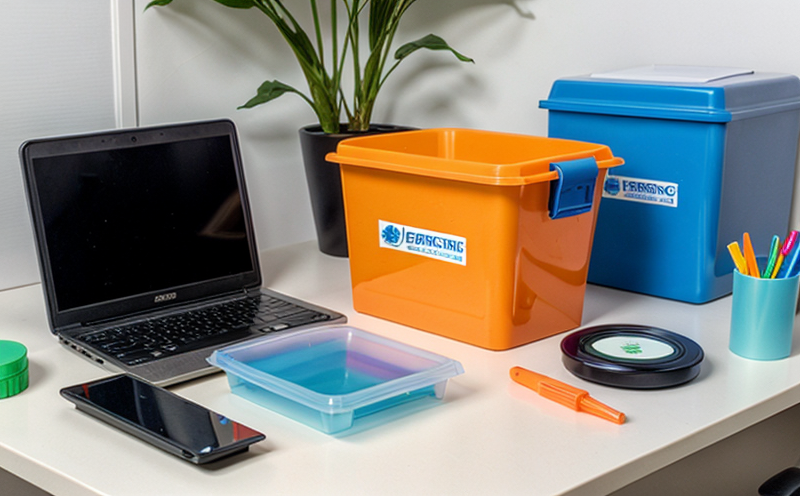JIS K 7217 Resistance Testing of Plastics Against Cleaning Agents in Offices
The JIS K 7217 standard is a Japanese Industrial Standard that provides guidelines for assessing the resistance of plastics used in office environments to cleaning agents. This testing method is essential for ensuring the durability and longevity of office stationery products, which are frequently exposed to various cleaning solutions. Compliance with this standard ensures that these materials can withstand daily wear and tear without compromising their performance or safety.
The testing procedure involves subjecting plastic specimens to a series of cleaning agents commonly used in office settings. These include water-based cleaners, alcohol-based solvents, and other chemical compounds typically employed for cleaning purposes. The objective is to evaluate how well the materials maintain their structural integrity, appearance, and functionality after exposure.
Proper specimen preparation is critical for accurate results. Specimens should be cut from typical office stationery products such as pens, folders, notebooks, and file cabinets. Each piece must be representative of the intended use and material composition. The specimens are then cleaned according to JIS K 7217 guidelines using specific cleaning agents at controlled temperatures and durations.
After exposure, the specimens undergo visual inspection for changes in color, texture, or appearance. Additionally, mechanical tests may be conducted to measure any reductions in tensile strength, impact resistance, or other physical properties. The results are compared against baseline data to determine compliance with JIS K 7217.
This testing method is particularly important for quality managers and compliance officers responsible for ensuring product reliability and safety. R&D engineers can use this information to refine materials and processes, while procurement teams can select suppliers based on their adherence to such standards. By adhering to JIS K 7217, manufacturers contribute to a more sustainable office environment by producing durable products that last longer.
The standard is part of an ongoing effort to improve the quality and durability of materials used in office settings. It reflects the industry's commitment to both performance and sustainability. By investing in these tests early in the development process, companies can avoid costly recalls and ensure a positive reputation among customers who value reliability and longevity.
The testing procedure described aligns with broader efforts to enhance the quality and durability of materials used in office settings. It reflects the industry's commitment to both performance and sustainability. By adhering to JIS K 7217, manufacturers contribute to a more sustainable office environment by producing durable products that last longer.
Applied Standards
| Standard Number | Description |
|---|---|
| JIS K 7217 | Method of Testing the Resistance of Plastics to Cleaning Agents in Office Environments |
| ASTM D543 | Determination of Tensile Properties of Plastics |
| EN 12879:2016 | Durability and Resistance to Chemical Agents for Office Furniture |
The JIS K 7217 standard is complemented by other international standards such as ASTM D543, which measures the tensile properties of plastics. These additional tests provide a more comprehensive evaluation of plastic materials' performance and durability under various conditions.
Industry Applications
The application of JIS K 7217 resistance testing in office environments is particularly important for manufacturers of stationery items such as pens, folders, notebooks, and file cabinets. These products are frequently exposed to cleaning agents during routine maintenance and use. The testing ensures that these materials remain functional and aesthetically pleasing after repeated cleanings.
For example, a manufacturer of office pens would want to ensure that the ink does not bleed or change color after exposure to cleaning agents. Similarly, folders made from plastic-coated paper should maintain their stiffness and smoothness, while notebooks with plastic covers should resist damage from solvents used in cleaning processes.
The testing process also benefits companies involved in the design and production of office furniture such as desks, chairs, and filing cabinets. These items often come into contact with various cleaning agents that could potentially affect their longevity if not properly tested beforehand.
By adhering to JIS K 7217, manufacturers can ensure that their products meet or exceed the expectations set by this standard. This not only enhances product quality but also contributes to a more sustainable office environment where materials are used efficiently without compromising on performance and aesthetics.
Environmental and Sustainability Contributions
The JIS K 7217 resistance testing plays a crucial role in promoting environmental sustainability by ensuring that office stationery products remain functional and aesthetically pleasing even after repeated cleanings. This contributes to reducing waste generation, as durable materials last longer and require fewer replacements.
By adhering to this standard, manufacturers can minimize the environmental impact associated with frequent product replacement due to material degradation caused by cleaning agents. Additionally, the testing process helps identify potential areas for improvement in material selection and manufacturing processes, leading to more sustainable practices throughout the supply chain.
The use of JIS K 7217 also encourages innovation in the development of new materials that are not only resistant to cleaning agents but also environmentally friendly. This includes using recycled or biodegradable components whenever possible, which further reduces the carbon footprint associated with product manufacturing and disposal.
In summary, compliance with JIS K 7217 resistance testing is an essential step towards achieving a more sustainable office environment where materials are used efficiently without compromising on performance and aesthetics. By investing in these tests early in the development process, companies can avoid costly recalls and ensure a positive reputation among customers who value reliability and longevity.





